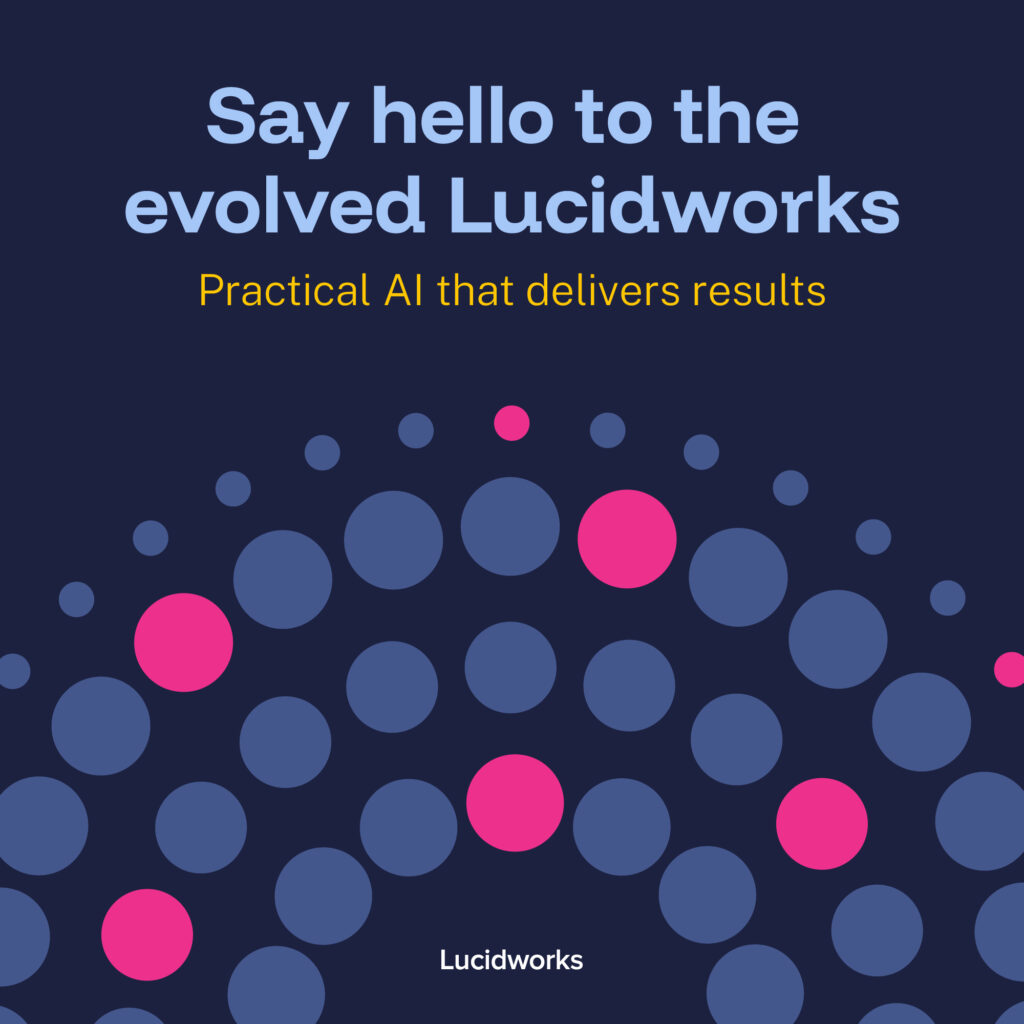From search company to practical AI pioneer: Our vision for 2025 and beyond

I’m happy to introduce the new Lucidworks! We still take your most complex data sets and make them earn their keep. Except now we’ve taken our industry leading technology and made it even easier to connect, faster to deploy, and simpler to use.

Fifteen years ago, Lucidworks started as a little search company. Fast forward more than a decade, and generative AI explodes onto the scene. Suddenly everyone wants to talk about what we’ve been doing all along: finding information, indexing it, categorizing it, and making it useful for the people who need it.
At Lucidworks, we’ve always believed that the future isn’t about replacing humans with AI—it’s about building solutions that amplify what humans do best. This fundamental principle has guided our journey from search specialists to practical AI pioneers, and it’s reflected in our refreshed brand identity we’re unveiling today.
Here’s how I explain what we do: Think about what Google does for the world’s information. Imagine doing that for commerce, site search, AND a company’s internal information such as employee files, cost data, and customer lists. Unlike Google, however, we don’t make all the information readily available to the entire world. We make it available when it’s needed, where it’s needed, and to whom it’s needed.
Our new look isn’t just a fresh coat of paint. It shows how we’ve grown up alongside our customers. The clean design and confident colors reflect what we do best—cut through complexity and deliver solutions that work. While our look has changed, our mission hasn’t: making information useful for the people who need it.
The reality behind the AI hype
Over the past two years, everyone has been rushing headfirst into AI. Our 2023 inaugural AI benchmark study showed that 93% of companies planned to increase their AI spending. The excitement from ChatGPT’s launch was contagious, but something interesting has happened since then. In our 2024 study, that number dropped to 63%—still significant, but a clear sign that companies are taking a more measured approach.
This isn’t bad news. It’s a sign of maturity. We’ve watched companies go through a fascinating evolution with AI. First, they were mesmerized by large language models—they seemed magical. Then came the security concerns: “Is my data going to end up in someone else’s model?” Next, accuracy became the big worry: “What if it hallucinates?” (to that, we answer with the video below that shows exactly what happens when your AI hallucinates.)
Finally, everyone looked at the price tag and realized this could get expensive fast. When paying $30-60 per million tokens for advanced LLMs compared to just $1-3 per million for traditional ML approaches, those costs add up quickly. One client discovered their planned LLM implementation would cost over $2 million annually just in API fees—before adding any customization or integration costs.

Where we’re headed: It’s about solutions, not models
What’s become crystal clear is that success with AI isn’t about having the fanciest model—you don’t need to pay so much attention to the AI wars between LLM providers like DeepSeek and OpenAI.
Why not? It’s all about having the right solution. Think of it this way: the AI model is just one piece in the middle, and it’s becoming the least important part. Everything around it matters: how you get the data in, keep it secure, ensure accuracy, control access, and manage costs.
I’m excited to announce our new Commerce Studio™ and Analytics Studio™, alongside our AI orchestration engine. These aren’t just tools—they’re complete solutions for how business works in 2025. They handle the heavy lifting while keeping humans firmly in control. Sure, AI is part of it—including AI models—but what matters most is the output of these solutions, not the cool tech that powers them.
Why search and practical AI matter now
Finding and using information effectively has never been more critical. McKinsey tells us data will grow 10x between 2020 and 2030. That’s staggering. Every day, the gap gets wider between companies that can use all this information and those drowning in it. We’re seeing three key areas where our customers need help right now:
E-Commerce
Simply put, if customers can’t find what they need, they leave. About 68% of them bounce immediately if search doesn’t work well. Good product discovery isn’t optional anymore—it’s make or break. The winners show customers exactly what they need, when they need it.
Knowledge Management
After the Great Resignation, companies realized how much knowledge walked out the door. The average employee now spends more than an entire workday each week—9.3 hours—just searching for information. That’s so wasteful and inefficient. However, making internal knowledge easy to find isn’t just about productivity. It’s about keeping your business running smoothly when things change.
Customer Support
Customer expectations keep rising while support teams are under pressure to control costs. Moving from basic FAQs to smart AI-powered support isn’t a nice-to-have anymore—it’s a business necessity. The companies doing this right use AI to help their human agents, not replace them.
What’s changed is what we call “signals.” Companies winning today have 10x more data sources than just a few years ago. All this comes together to create experiences that move the needle on business results—not just demos that look cool in a boardroom.
Why we’re keeping humans in the loop
While AI transforms our work, it’s not replacing human judgment. I have two kids just entering the workforce, and we discuss this frequently. Yes, AI will replace some entry-level tasks, but there’s something I like to quote: “Amazon’s algorithms are great, but they’ve got no style.” There will always be a need for human creativity, taste, and innovation.

This is why we’ve built our Studios with humans at the center. In our digital commerce and enterprise search world, we’ve seen firsthand how purely automated approaches miss the mark. A merchandiser’s gut feeling about seasonal trends, a knowledge worker’s understanding of company priorities, a support agent’s empathy—these human elements can’t be replicated by algorithms alone.
Our Studios enable collaborative intelligence where AI handles the heavy lifting—processing massive datasets, spotting patterns, doing repetitive tasks—while humans provide the guidance, quality control, and creative direction. This works exceptionally well for our retail clients, where merchandisers use our tools to create shopping experiences that reflect their brand’s unique style and vision—something no algorithm can do independently.
From AI adoption to AI impact: What our benchmark studies reveal
The companies s쳮ding with AI today—and our clients are 2.5x more likely to be successful than their peers—aren’t the ones treating it like a magic wand. They take a practical, measured approach, focusing on specific business problems they can solve.
As we move through 2025, we’ll continue expanding our vision with new capabilities like our upcoming Knowledge Management packages. But our core focus remains the same: helping businesses harness AI’s power while maintaining complete control over their destiny.
The future isn’t about replacing humans with AI—it’s about building solutions that amplify what humans do best. That’s what gets me excited about coming to work every day, and that’s what Lucidworks is all about.
As we look ahead to our 2025 AI Benchmark Study, I’m particularly eager to see how the landscape has evolved. While our previous studies tracked the initial wave of AI adoption and the subsequent shift toward practical implementation, this year’s study will reveal something even more valuable: how companies use AI to transform their digital experiences. We’ll examine adoption rates and real success stories, measuring actual impact on customer experiences, and identifying which use cases deliver the most value.
The results will help guide our industry through its next phase of evolution, moving beyond the question of “Should we use AI?” to “How can we use AI most effectively?” Stay tuned—we’ll be sharing these insights soon.
Mike Sinoway is CEO of Lucidworks.